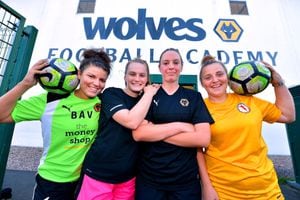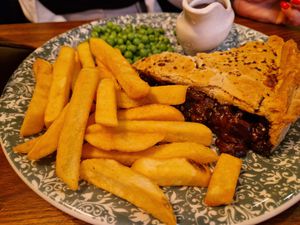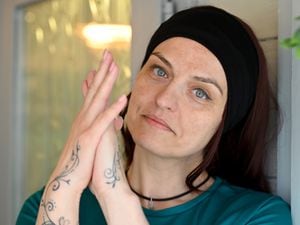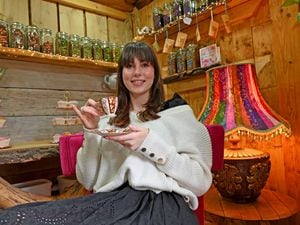Wolves Women: It’s a dream come true to play football
Women’s football is a growing sport and more ladies are striving to be the best. Weekend joins the Wolves team for a tough training session:

Be confident in your ability” rings out across the pitch as the ball flies into the box. Both attacking and defending sides lunge forward to meet it, a striker makes contact and shoots but narrowly misses the net.
“Reset,” shouts manager Tim Dudding and the ball is returned to the corner flag.
This set piece drill is repeated and repeated and repeated. And then repeated some more.
Welcome to a technical training night for Wolves Women FC.
With the club now in the FA Women’s Premier League Northern Division, having been promoted on the final day of last season, there is no let up for these players.
“They are among the top 30 teams in the country so we treat them like that. Every player here wants to be the best they can be and we are here to help them achieve that,” explains 22-year-old Tim, who has been with the club since October last year.
The club is in the third-tier of women’s football but a rung below the Super League – the female equivalent of the Premier League – which is split into two divisions; the WSL 1 and the WSL 2.
All areas of the women’s game have been growing in recent years.
The UEFA Women’s Euro 2017 at the start of the summer saw record numbers tuning in to watch the matches on Channel 4.
While nearly three million women now play some form of football in England. There are almost 6,000 women and girls’ football clubs and the FA are aiming to double that by 2020.
There has also been a big push to provide teaching resources in schools and the FA recently launched a programme called Wildcats for 5 to 11-year-olds.
The FA also has Regional Talent Clubs (RTC), which are responsible for the delivery of elite girls’ football development at 34 clubs and centres including Wolves.
As well as the 24-strong Wolves Women first team and 17 under-18s players who train together, there are also sides for under-10s through to under-16s.
This along with similar investment across the country has seen more girls and women taking up the beautiful game.
Increased exposure for women’s football such as more television coverage and a growing interest amongst sponsors in recent years has also brought in more fans.
“I think the success of the England side has got people’s attention,” says 19-year-old Wolves central-midfielder Courtney Jones, who lives in Perton.
“We’ve noticed it with attendance at our games. Two or three years ago we would only have 15 people watching us and they would probably be friends or family. But now we are getting upwards of 180, which is a big difference,” she adds.
Courtney, a Chelsea fan, has been playing football since she was seven, although, like many players she had to start in a boy’s side, and says it is a dream come true to be able to play at a higher level.
“It’s something I’ve always enjoyed since I was little. It’s nice to be playing at the level we are at now and I love the competitiveness of it too.
“I was at Stoke for three seasons but I felt like my playing had started to plateau. It was time for a new challenge so I joined Wolves,” she tells us.
“The support we get from the men’s team is fantastic. It really helps us to build our own profile and for more people to know there is a women’s side too,” adds Courtney, who is working towards a degree in physical education and sports studies at the University of Worcester.
For vice-captain Mai Butler, who signed in March after eight years at Black Country rivals West Bromwich Albion, being one of the team is what makes being a Wolves woman special.
“It’s the feeling of togetherness that you don’t get from other sports. When you win everyone celebrates together and when we lose it we all spur one another on for the next game,” says the 21-year-old, who is also studying for a PGSE at the University of Worcester.
Winger Billie Haynes from Cannock was another summer signing for the club, joining the ranks from Aston Villa.
The 19-year-old has been playing since she was five and was in boys teams until she reached the under-14s.
“There are definitely more girls sides now than there used to be. I just love playing football and it’s great to be able to play at this level,” she says.
Club captain is 31-year-old Anna Price who has been with Wolves since she was nine. “I love playing football, it’s a big part of my life. I’m proud to be playing for the club I support and for my home town club.
“We get a lot of support from the men’s club. We were involved in the kit launch for the first time this year.
“It’s a family environment. Everyone gets on with each other, there are no funny cliques. It’s a really nice bunch of girls,” says Anna, who lives in Codsall and is a PE teacher at Thomas Telford School.
So far their new league has been baptism of fire for Wolves, who lost their opening game against last season’s champions Blackburn Rovers Ladies 3-0.
Then they suffered a second blow as they were defeated by last season’s league runners-up, Middlesbrough Women, 4-3 thanks to an 88th minute goal by the visiting side. Last weekend they lost 2-0 to Liverpool Marshalls Feds in the FA Women’s Premier League Cup.
But Anna is relishing the challenge that has come with promotion to a higher league. “I’m optimistic. It’s going to be difficult but our target is to make sure we stay up and remain in the league this season.
“The next two or three seasons will be about building on this and working towards winning the league,” she adds.
There is certainly a lot of positively surrounding the club with hopes of a bright future ahead.
Tim says a lot of effort has been made to make it more professional from using the same branding and graphics as the men’s club when promoting themselves to joining forces for training sessions.
“There is a big drive to make it as professional as it can be in line with the men’s club. For example, I’ve been to watch my counterpart on the men’s side at a training session so I can see what they do and try to incorporate some of it into what we are doing here.The support we’ve had from the men’s club has been phenomenal. We also get a lot of support from the community.
“Q Technical Services are our main sponsor and provide the full training kit from under-10s to our level. London Wolves are sponsoring us for our away travel for the season.
“At Hednesford Town’s ground, where we play our games, they have put up a sign saying ‘Home of Wolves Women’ which helps to raise our profile,” he says.
But women’s football is still a long way behind the men’s and there are even gaps between the top tier and the lower leagues in the female game.
The very best players in the Super League can earn between £30,000 and £50,000 a year including all sponsorship and bonuses.
But this pales in comparison to the likes of Everton’s Wayne Rooney, who reportedly takes home six times that in just a week.
At Wolves Women, there are no wages with players having to find the £300 they need to fund their playing fees, equipment and travel themselves either out of their own pocket or through sponsorship from local businesses.
“The reality is that if they find sponsorship, they can play for free but if they don’t they have to fund themselves.
“They are in the top 30 clubs in the country but I take their kit home, wash it and hang it on my washing line. You can’t imagine a Premier League coach doing the same can you? This is the difference between men’s and women’s football,” says Tim.
For the head coach, developing the women’s game further in the future means ensuring that that there are sufficient opportunities at all levels.
“The fact that more girls and women are playing football is fantastic but it’s a pyramid and it has to be carefully managed to ensure the gulf between those at the very top – the elite – and the sub-elite does not grow any greater.
“It’s no good getting more girls and women playing if there is nowhere for them to aim for at all levels. We need to give them the facilities and chances to play at a high level that the players deserve,” adds Tim.
The proud coach says he is in awe of the commitment and dedication of his own team.
“I describe these players as real life heroes. They come to training two nights a week after working all day. I have to motivate them without the £30,000 a year. But playing football means everything to them and that’s why they do it.”
Despite their tough start, he is feeling confident about his side’s chances of staying up this season believing they have held their own against some strong opposition.
“We’ve had a good start to the season – I know people won’t believe it when we have lost our two opening league games but we played two teams that finished top of the league. We lost to Middlesbrough 4-3 because of our own mistakes. We scored three great goals but conceded three awful goals.
“But we played some fantastic football. We lost 3-0 to Blackburn but we held them at 3-0 for 70 minutes and this is the team that finished top last season.
“The baptism of fire that we expected, that’s happened. But we’ve been learning, communicating with each other more and adapting to the challenge. We just need to keep pushing on and working hard,” says Tim.
“There is a fantastic morale among the players at the moment and a really positive vibe about the club.”
* Follow Wolves Women on Twitter @wolveswomenfc
Heather Large





